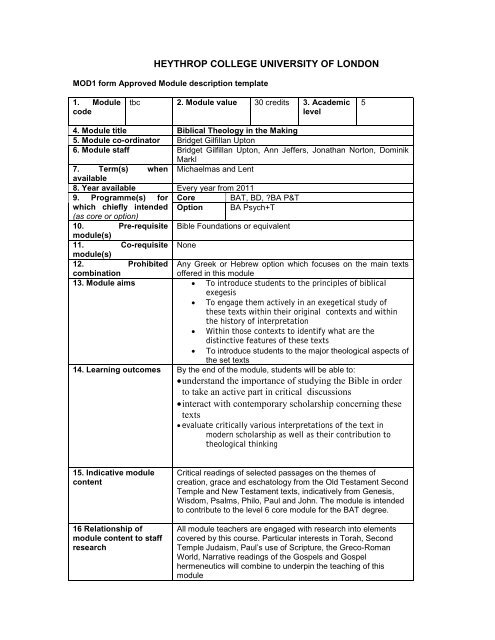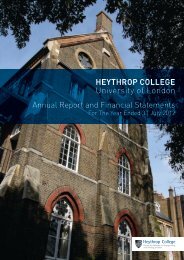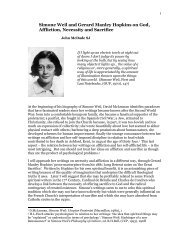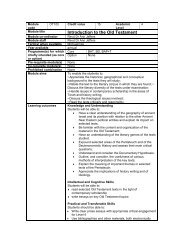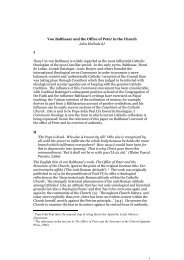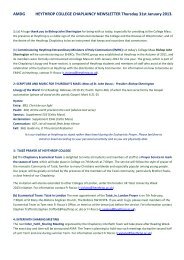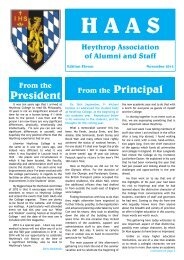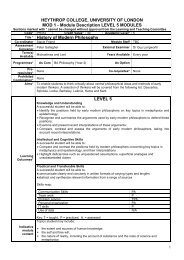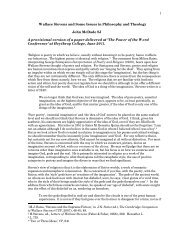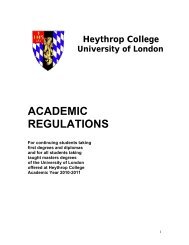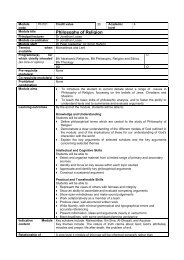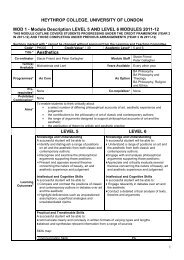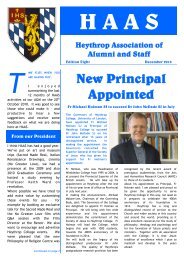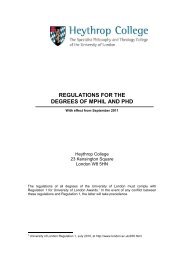TBC - Heythrop College
TBC - Heythrop College
TBC - Heythrop College
You also want an ePaper? Increase the reach of your titles
YUMPU automatically turns print PDFs into web optimized ePapers that Google loves.
HEYTHROP COLLEGE UNIVERSITY OF LONDON<br />
MOD1 form Approved Module description template<br />
1. Module<br />
code<br />
tbc 2. Module value 30 credits 3. Academic<br />
level<br />
5<br />
4. Module title Biblical Theology in the Making<br />
5. Module co-ordinator Bridget Gilfillan Upton<br />
6. Module staff Bridget Gilfillan Upton, Ann Jeffers, Jonathan Norton, Dominik<br />
Markl<br />
7. Term(s) when Michaelmas and Lent<br />
available<br />
8. Year available Every year from 2011<br />
9. Programme(s) for Core BAT, BD, BA P&T<br />
which chiefly intended Option BA Psych+T<br />
(as core or option)<br />
10. Pre-requisite Bible Foundations or equivalent<br />
module(s)<br />
11. Co-requisite None<br />
module(s)<br />
12. Prohibited Any Greek or Hebrew option which focuses on the main texts<br />
combination<br />
offered in this module<br />
13. Module aims • To introduce students to the principles of biblical<br />
exegesis<br />
• To engage them actively in an exegetical study of<br />
these texts within their original contexts and within<br />
the history of interpretation<br />
• Within those contexts to identify what are the<br />
distinctive features of these texts<br />
• To introduce students to the major theological aspects of<br />
the set texts<br />
14. Learning outcomes By the end of the module, students will be able to:<br />
• understand the importance of studying the Bible in order<br />
to take an active part in critical discussions<br />
• interact with contemporary scholarship concerning these<br />
texts<br />
• evaluate critically various interpretations of the text in<br />
modern scholarship as well as their contribution to<br />
theological thinking<br />
15. Indicative module<br />
content<br />
16 Relationship of<br />
module content to staff<br />
research<br />
Critical readings of selected passages on the themes of<br />
creation, grace and eschatology from the Old Testament Second<br />
Temple and New Testament texts, indicatively from Genesis,<br />
Wisdom, Psalms, Philo, Paul and John. The module is intended<br />
to contribute to the level 6 core module for the BAT degree.<br />
All module teachers are engaged with research into elements<br />
covered by this course. Particular interests in Torah, Second<br />
Temple Judaism, Paul’s use of Scripture, the Greco-Roman<br />
World, Narrative readings of the Gospels and Gospel<br />
hermeneutics will combine to underpin the teaching of this<br />
module
17. Learning and<br />
teaching methods<br />
18 Transferable skills<br />
developed in this<br />
module<br />
19. Selected<br />
Bibliography:<br />
Essential texts<br />
Interactive lectures with some group work<br />
Tutorials as specified for level 5 modules<br />
Skill T, P, A <br />
Communication<br />
P<br />
Use of IT<br />
P<br />
Application of Number <br />
Working with others T P<br />
Improving own learning T P A<br />
and performance<br />
Problem solving<br />
T P A<br />
T<br />
This skill is taught<br />
P<br />
Opportunities to practice this skill<br />
A<br />
This skill is assessed<br />
Bible: New Revised Standard version<br />
Prophecy:<br />
J. Blenkinsopp, A History of Prophecy in Israel (Louisvill, KY:<br />
Westminster John Knox Press, 1996)<br />
Opening the sealed Book: Interpretation of the Book of Isiaiah in<br />
Late Antiquity (Grand Rapids, Mich.: Eerdmans, 2006).<br />
Clements, R. E. (1980). Isaiah and the Deliverance of<br />
Jerusalem: A Study of the Interpretation of Prophecy in the Old<br />
Testament. Sheffield: Journal for the Study of the Old<br />
Testament.<br />
T. Collins, The Mantle of Elijah (Sheffield: JSOT, 1993)<br />
Conrad, E. Reading the Latter Prophets. Toward a New<br />
Canonical Criticism (JSOTSup. 376, London T & T Clark, 2003)<br />
K. Kloch, The Prophets (London: SCM Press, 1982) (2 volumes)<br />
H. McKay and D. J.A. Clines, Of Prophets’ Visions and the<br />
Wisdom of Sages (Sheffield Academic Press, 1993)<br />
T. W. Overholt, Channels of Prophecy: the Social Dynamics of<br />
Prophetic Activity (Minneapolis: Fortress Press, 1989)<br />
Williamson, A Critical and Exegetical Commentary on Isaiah 1-<br />
27 (ICC, London: T & T Clark, 2006)<br />
Psalms:<br />
W. Bruggemann, The Message of the Psalms: A Theological<br />
Commentary (Minneapolis, 1984)<br />
J. Day, Psalms (OT Guides, 1992)<br />
S.E. Gillingham The Poems and Psalms of the Hebrew Bible<br />
(Oxford: OUP, 1994)<br />
K. Seybold, Introducing the Psalms (T&T Clark, 1990)<br />
Commentaries on John:<br />
Brown, R E The Gospel according to John (Two volumes Anchor<br />
Bible Commentary 1966-70)<br />
Lincoln, Andrew St John (London, NY 2005)<br />
Selected other<br />
recommended texts<br />
On the Gospel of John:<br />
Ashton, John Studying John: Approaches to the Fourth Gospel<br />
(Oxford 1994)<br />
Davies, Margaret Rhetoric and reference in the Fourth Gospel<br />
(Sheffield 1992)
Donahue, John (ed) Life in Abundance: Studies of John’s<br />
Gospel in tribute to Raymond E Brown (Minnesota 2005)<br />
Fortna, Robert T and Tom Thatcher (eds) Jesus in Johannine<br />
Tradition (Louisville KY 2001)<br />
Scott, Martin Sophia and the Johannine Jesus (Sheffield 1992)<br />
20. Assessment and<br />
feedback on<br />
performance<br />
21. In module student<br />
evaluation opportunities<br />
Standard pattern for level 5 modules:<br />
3 essays, contributing a total of 40% of the final mark<br />
3 hour examination, contributing 60% to the final mark<br />
Student evaluation forms<br />
Staff-student liaison committee<br />
22. Indicative student<br />
time allocation<br />
23. Date of module<br />
description<br />
development or<br />
modification<br />
300 hours<br />
Lectures 44 Hours<br />
Tutorials 3 hours<br />
Reading, preparation, essay writing, revision 253 hours<br />
28.02.10


